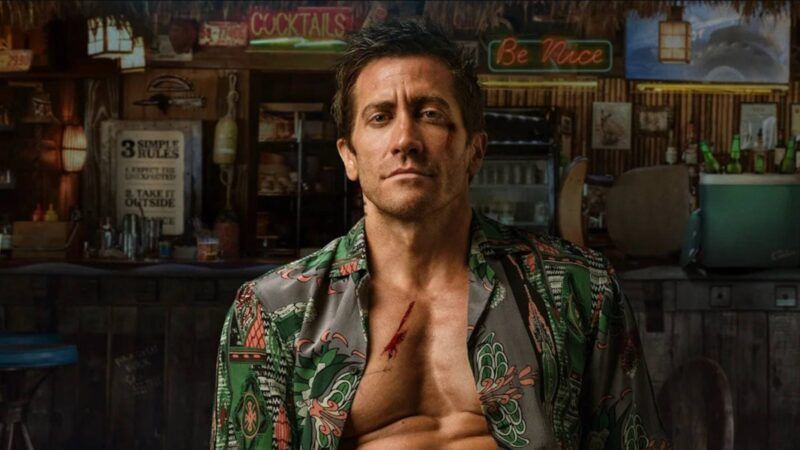Patrick Swayze's Road House Defined the So-Bad-It's-Good Movie. The Remake? Not So Much.
A just-good-enough remake fails to live up to its predecessor.

In the pantheon of so-bad-it's-actually-good movies, few can compete with the original Road House. Made in the prime of Patrick Swayze's star career, just after Dirty Dancing and just before Ghost and Point Break, it's one of the most charmingly ridiculous action films ever made. The plot is simple, almost mystical, more like a Sergio Leone Western than a typical 80s beat-'em-up: a famous bouncer Dalton (Swayze) is hired from out of town to clean up a rowdy saloon, and, in the process, the corruption of the small Missouri town where the bar is located. There are a lot of rowdy bar fights, some gratuitous nudity, and a late-film sequence where Sam Elliot shows up and he and Swayze drink, dance, fight, and talk shit for what appears to be about 72 hours straight without sleeping.
Also, there's a scene where Swayze kills a local thug by literally ripping his throat out. Somehow, it's all even more awesome than it sounds.
When Road House hit theaters in 1989, critics gave it a resounding thumbs down, calling it cheesy, exploitative, and a little dim. It was trash. Well, yes. But that was sort of the point. The movie eventually found its way to cult status, becoming a wink-wink favorite amongst a certain sort of action fan. In part, that's because of its particular alchemy of movie-star charisma—the smoothly cool way Swayze delivers Dalton's hammy lines—and its weird details: There's a scene with a monster truck! The bar has a house band led by a blind guitar player! Dalton isn't just a bouncer, he's also a New York University philosophy grad!
But partly it's because, in the following decade, it became one of the most-shown movies on TV. Road House was a fixture on cable networks in the 1990s, especially late at night, to the point where it sometimes seemed like a time-filling crutch for cable network programmers. Need something to air after 9 p.m.? Why not Road House?
Road House wasn't a movie that you sat down and watched from beginning to end. It was a liminal space in the pre-streaming cable-verse that sucked you in while channel surfing late at night, the black hole of 90s cable TV. It was so bad it was good, yes, but it was something beyond that, something purer and stranger. Over years of watching it in late-night snippets between infomercials, letting it numb you into sleep as a sort of non-pharmaceutical insomnia treatment, it just wore you down. As Dalton says, "Pain don't hurt." Yeaaaah, man.
It was inevitable, then, that at some point there would be a remake. That point is now, with the release of Road House (2024), starring Jake Gyllenhaal and directed by Doug Liman. Both Gyllenhaal and Liman are, in their own ways, formidable Hollywood talents. Liman is the director of enjoyably punchy blockbusters like Mr. & Mrs. Smith and Edge of Tomorrow. Gyllenhaal, at 42, is perhaps the quirkiest of today's early middle-aged male movie stars. No one will ever recreate Swayze's particular charisma, his blend of dancer's physicality and proto-bro zen, but Gyllenhaal has an offbeat charm of his own. And like Swayze in his prime—more so, frankly—he's outrageously ripped.
The new Road House, then, is mostly a movie about Gyllenhaal, once again playing a famous bouncer named Dalton, taking his shirt off and beating the crap out of other dudes while saving a bar—now based in the Florida Keys—from a rapacious local businessman (Billy Magnussen) and his army of thugs. It's amusing at times, with Gyllenhaal playing Dalton as laconic and understated, in contrast to the outsize shenanigans of the baddies around him. The movie's best moments are its weirdest—odd one-liners, an offbeat henchman, a not-quite-random attack by a crocodile.
But the CG-assisted fight scenes are too slick, with whip pan, digitally stitched-together photography that doesn't show off the performers' physicality. That's a shame, since the movie has also given Dalton a new backstory as a UFC fighter, and cast UFC fighter Conor McGregor as the scenery-chewing tough guy Knox. Aside from the crocodile gag, the Florida setting is under-utilized, and the oddball characters at the bar don't make much of an impact. The movie feels stuck in the no-man's-land between quality blockbuster filmmaking and trashy direct-to-streaming action. It's perfunctory, and I can't imagine watching it again even once, much less over and over as a late-night indulgence.
The new Road House is not a bad movie, exactly, but it's not a particularly good one either—and, rather disappointingly given its heritage, it's certainly not so bad it's good.


Show Comments (38)